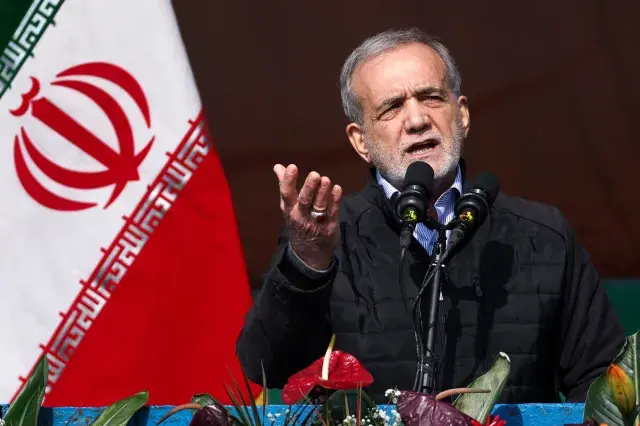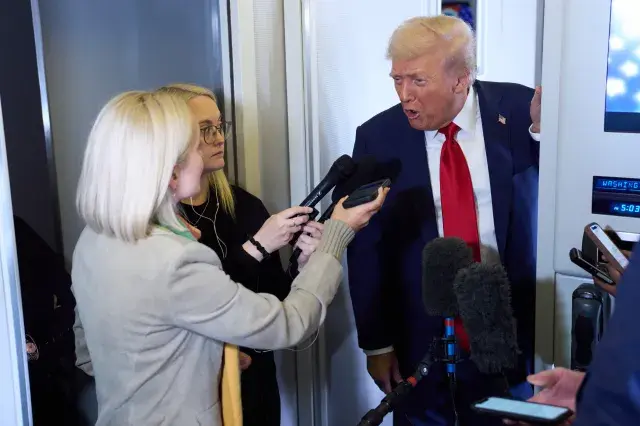-
Republicans’ chances of flipping California governor seat, according to polls - 7 mins ago
-
The Shifting Politics of Transgender Rights - 10 mins ago
-
Dodgers World Series Hero Planning To Retire After 2026 Season - 41 mins ago
-
Immigrants’ Fears - 53 mins ago
-
Loss of federal funds could make thousands homeless in L.A. County - about 1 hour ago
-
Bath & Body Works Annual Candle Day Is Back - about 1 hour ago
-
The Childhood Vaccine Under Threat, and Trump’s Newest Push for Gas-Powered Cars - 2 hours ago
-
Dak Prescott Gets Concerning Cowboys Announcement Ahead of Lions Game - 2 hours ago
-
‘The Snake’ stretch of Mulholland Hwy. reopens after 6 years - 2 hours ago
-
Trump to Host Congo and Rwanda Leaders for Peace Talks in Persistent Conflict - 2 hours ago
Iran Snubs Trump at Gaza Summit
Iran announced on Monday that neither President Masoud Pezeshkian nor Foreign Minister Abbas Araghchi would attend the Gaza peace summit in Egypt co-chaired by U.S. President Donald Trump.
Araghchi has said he will not meet with counterparts “who have attacked the Iranian People and continue to threaten and sanction us.”
The decision marks a dramatic snub of a high-profile diplomatic gathering and underscores Tehran’s deepening rift with Washington amid efforts to forge a postwar peace framework for Gaza.
Newsweek has contacted the U.S. State Department and Iran’s Foreign Ministry for comment.
Why It Matters
International leaders are gathering in Egypt’s Red Sea resort of Sharm el-Sheikh for the high-profile summit, which concerns not only ending the Gaza conflict but also advancing a broader framework for peace in the Middle East.
Iran’s boycott underscores its refusal to engage diplomatically with the United States, even on humanitarian or regional peace initiatives, amid persistent mistrust after years of sanctions, recent military confrontations and escalating tensions across the region.

What To Know
Iranian state news agencies reported that Egypt extended an invitation to Tehran late on Sunday to join the summit.
Early on Monday, Araghchi wrote on X that neither he nor Pezeshkian would attend, citing U.S. aggression toward Iran. His remarks referenced Washington’s participation alongside Israel in airstrikes that targeted Iranian nuclear sites during a 12-day war in June.
Although Tehran rejected the invitation, Araghchi reiterated Iran’s backing for Palestinians’ right to self-determination and for “any initiative that ends Israel’s genocide in Gaza.” Iran, which does not recognize Israel, has made support for the Palestinian cause a cornerstone of its foreign policy since the 1979 Islamic Revolution that ousted the U.S.-backed Shah Mohammad Reza Pahlavi.
What the Summit Seeks to Achieve
The Gaza summit, co-chaired by Trump and Egyptian President Abdel Fattah el-Sisi, takes place on Monday and seeks to “end the war in the Gaza Strip, enhance efforts to bring peace and stability to the Middle East, and usher in a new phase of regional security and stability,” the Egyptian president’s office said in a statement.
Leaders from more than 20 nations are expected to attend, though neither Israel nor Hamas are participating. Iran’s absence removes one of the region’s most influential players from discussions set to shape the future of Gaza and regional stability.
‘Historic Opportunity’
Tehran’s decision to skip the summit has exposed sharp divisions within Iran’s political establishment. While the choice not to attend aligns with Supreme Leader Ali Khamenei’s hard-line stance toward the U.S. and Israel, moderates and reformists have voiced disappointment, calling it a missed diplomatic opportunity.
Reformist journalists Mohammad Mohajeri and Mohammad Ghouchani urged Pezeshkian “not to miss this historic opportunity,” arguing that participation would have supported Iran’s strategy of indirect negotiation without implying recognition of Israel.
Former diplomat Hamid Aboutalebi also described the reported U.S. invitation as “a positive and welcome signal,” writing on X that it reflected “a desire to return to dialogue and constructive engagement” that could have opened the door to “direct and comprehensive talks.”

What People Are Saying
Iranian Foreign Minister Abbas Araghchi wrote on X: “While favoring diplomatic engagement, neither President Pezeshkian nor I can engage with counterparts who have attacked the Iranian People and continue to threaten and sanction us.”
U.S. President Donald Trump told reporters before boarding Air Force One to visit the Middle East: “This is going to be a very special time. … This is a very special event.”
What Happens Next
Iran’s decision to skip the Sharm el-Sheikh summit leaves the future of Gaza and the broader Middle East peace process uncertain. Though Tehran says it remains open to diplomacy, its absence underscores the difficulty of building regional consensus amid deep-seated rivalries and complex alliances.
Source link




















